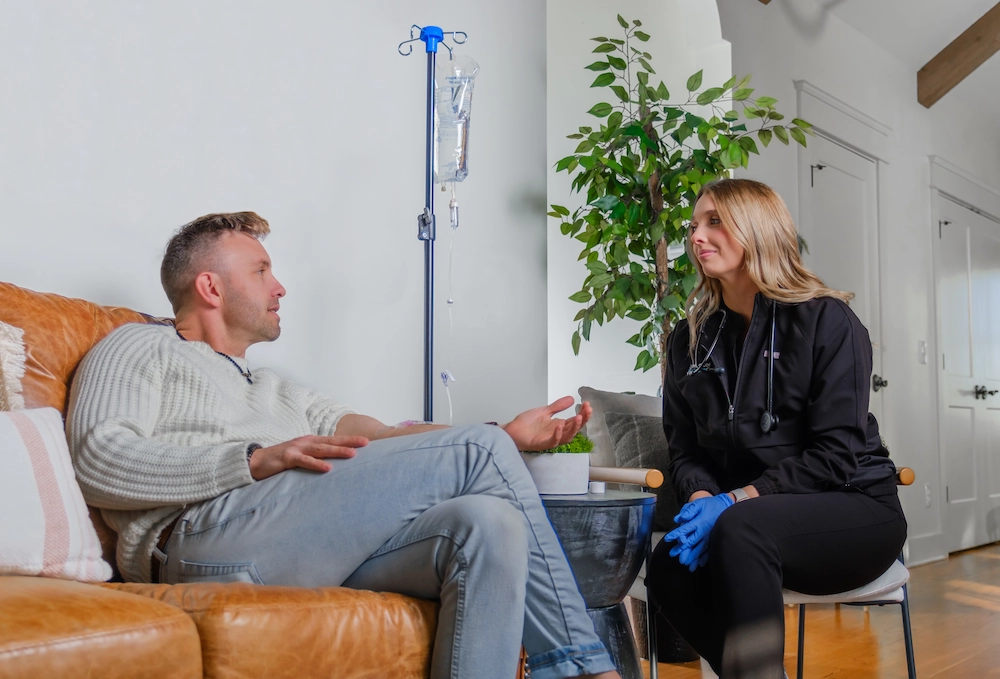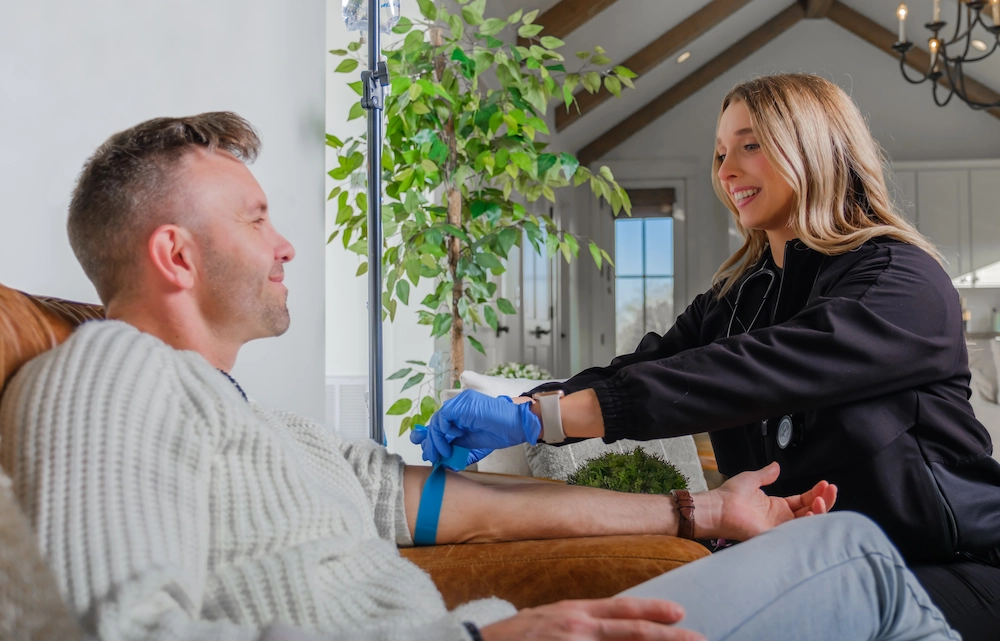Table of Contents
Beyond Parched: Urgent Signs Dehydration Needs Hospitalization
Dehydration is more than just a lack of water—it’s a condition that can escalate rapidly, leading to health complications. While mild dehydration can often be managed at home, there are times when it becomes critical and requires immediate medical attention. Discerning the warning signs and knowing when to go to the hospital for dehydration can make a crucial difference in outcomes, ensuring you or your loved ones receive the necessary care in time.
In this article, Medical House Calls will explore the symptoms of severe dehydration, the risks involved, and the key indicators that signal it’s time to seek emergency treatment.

Recharge with At-Home IV Therapy
Understanding Dehydration
Dehydration occurs when the body loses more fluids than it takes in, disrupting the balance of minerals and electrolytes. If untreated, this can interfere with bodily functions and lead to complications.
Symptoms of Dehydration
Dehydration symptoms can range from mild to severe, depending on the extent of fluid loss. Key indicators to watch for include:
- Thirst: The most obvious and early sign of dehydration.
- Dry Mouth and Skin: A parched feeling in the mouth and dryness or loss of elasticity in the skin.
- Dark Yellow Urine: Urine that is darker in color and has a strong odor is a sign of dehydration.
- Fatigue: Feeling unusually tired or weak, even after adequate rest.
- Dizziness or Lightheadedness: A feeling of unsteadiness or faintness.
- Decreased Urination: Urinating less frequently than usual.
- Confusion or Irritability: Mental confusion, difficulty concentrating, or mood changes.
- Rapid Heartbeat and Breathing: An increased heart rate and quickened breathing as the body attempts to maintain blood pressure.
Severe dehydration can manifest with more critical symptoms, such as:
- Extreme Thirst: An overwhelming need to drink water.
- Sunken Eyes and Cheeks: Noticeable sinking of the eyes and cheeks.
- Low Blood Pressure: Hypotension, especially when moving from lying down to standing up.
- Rapid Breathing and Heart Rate: A rapid pulse and quickened breathing.
- Shock: In extreme cases, dehydration can lead to hypovolemic shock, a life-threatening condition that requires immediate medical attention.
Risk Factors for Dehydration
Certain factors can increase the likelihood of becoming dehydrated, making awareness and preventive measures essential:
- Age: Infants, young children, and older adults are at higher risk due to their bodies’ reduced ability to conserve water and sense thirst.
- Climate: Hot and humid weather can lead to excessive sweating, increasing fluid loss.
- Physical Activity: Intense exercise or physical labor, especially in hot conditions, can cause significant fluid loss through sweat.
- Illness: Fever, vomiting, diarrhea, and chronic diseases like diabetes can lead to increased fluid loss.
- Medications: Some medications, including diuretics and laxatives, can contribute to dehydration.
- Diet: Inadequate fluid intake, excessive caffeine or alcohol consumption, and a high-sodium diet can contribute to dehydration.
- Chronic Conditions: Health issues such as kidney disease, cystic fibrosis, and adrenal gland disorders can impact fluid balance.
- Lack of Access to Clean Water: In some regions, limited access to safe drinking water can increase the possibility of dehydration.
Mild vs. Severe Dehydration
Mild Dehydration:
Occurs when there is a 1-2% loss of body weight due to fluid loss. It is often manageable at home with increased fluid intake. Symptoms include:
- Thirst
- Dry mouth
- Darker yellow urine
- Fatigue
- Dizziness or lightheadedness
- Decreased urine output
Severe Dehydration:
This occurs when there is a significant loss of body fluids, which is more than 5-6% of body weight. It requires immediate medical attention. Symptoms include:
- Extreme thirst
- Dry mouth and skin
- Sunken eyes and cheeks
- Rapid heartbeat and breathing
- Low blood pressure
- Confusion or irritability
- No urination or very dark yellow urine
- Shock (in extreme cases)
Methods of Rehydrating at Home
- Water: The simplest and most effective way to rehydrate. Sip water gradually to allow your body to absorb it.
- Oral Rehydration Solutions (ORS): Contains a balanced mix of electrolytes and glucose to aid in quick rehydration, especially after diarrhea or vomiting.
- Electrolyte Drinks: Sports or electrolyte-enhanced beverages can replenish lost minerals and fluids.
- Clear Broths and Soups: These can provide both fluids and essential nutrients.
- Fruits and Vegetables: Watermelon, cucumbers, and oranges have high water content and can contribute to hydration.
- Avoid Caffeine and Alcohol: They can act as diuretics and increase fluid loss.

Medical Interventions for Dehydration
While mild dehydration can be remedied with increased fluid intake at home, there are times when medical assistance is necessary. This section details the diagnostic tests and treatment options.
A. Diagnostic Tests
To determine the severity of dehydration and its underlying causes, healthcare providers may perform:
- Blood Tests: To check electrolyte levels, kidney function, and glucose levels.
- Urine Tests: To evaluate urine concentration and detect abnormalities.
- Physical Examination: To assess skin elasticity, blood pressure, and heart rate.
B. Treatment Options
- Intravenous (IV) Fluids: IV therapy is administered in severe cases to replace lost fluids and electrolytes.
- Medications: Anti-nausea or anti-diarrheal medications may be prescribed if vomiting or diarrhea is causing dehydration.
- Monitoring and Supportive Care: Analyzing vital signs and hydration status, especially in clinical settings.
C. At-Home Treatment
For mild to moderate dehydration, home treatments can include:
- Increased Fluid Intake: Drinking water, ORS, or electrolyte drinks as needed.
- Rest: Reducing physical activity to minimize further fluid loss.
- Cool Environment: Staying in a cool environment to prevent exertion.
Prevention of Dehydration
- Regular Hydration: Drink plenty of fluids throughout the day.
- Balanced Diet: Include water-rich foods in your diet, such as fruits and vegetables.
- Monitor Urine Color: Light yellow urine indicates good hydration.
- Limit Caffeine and Alcohol: Reduce intake of beverages that can cause fluid loss.
- Hydrate Before, During, and After Exercise: Ensure adequate fluid intake when engaging in physical activities.
When to Seek Medical Help
Seek medical help if you or someone else experiences:
- Symptoms such as extreme thirst, parched mouth, and sunken eyes.
- No urination for eight hours or more.
- Rapid heartbeat and breathing.
- Confusion, dizziness, or fainting.
- Shock, indicated by pale and clammy skin, rapid pulse, and shallow breathing.
Medical House Calls Offers Mobile IV Therapy
Recognizing the symptoms of dehydration and the risk factors is essential for prevention and intervention. Mild dehydration can be managed with home remedies, while severe dehydration requires medical care. Staying hydrated through regular fluid intake and being mindful of factors that contribute to dehydration can maintain optimal wellness. If dehydration does become severe, seeking medical help is crucial to avoid complications.
Medical House Calls offers mobile IV therapy services with an extensive menu that includes all the essential vitamins, electrolytes, antioxidants, and NAD+. Whether you need IV therapy at home, the office, or elsewhere, we come to you with all the necessary supplies. Text or call us to book a same-day or next-day appointment.
Unlock Vitality with NAD+ Therapy











